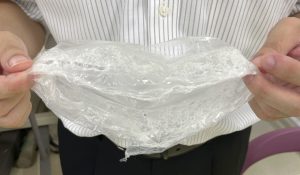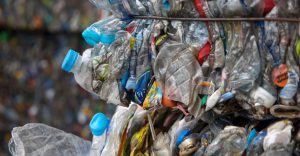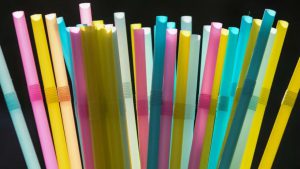Scientists working on an alternative to polluting plastic have discovered a biodegradable material derived from fish waste that would otherwise be thrown away, which could be used in a variety of products including packaging and clothing.

Canadian researchers say fish heads, bones, skin and guts heading for landfill can be turned into useful material that could replace crude oil-derived polyurethanes, which are found in everything from shoes and clothes to refrigerators and construction materials.
Existing polyurethanes come with a large carbon footprint and are slow to break down.
But the team, led by Francesca Kerton, who is based at the Memorial University of Newfoundland, found that fish-oil based plastics could provide an environmentally friendly solution while also tackling food factory waste.
Previous studies have developed methods for producing plastics from fish waste, but the latest research goes further in determining how the material might be easily broken down again at the end of its useful life.
To produce the new material, the researchers used oil extracted from bits of salmon left after the flesh had been removed and processed for human consumption.
They developed a way of converting the fish oil into a polyurethane-like polymer, first by adding oxygen to the oil in a controlled way to form epoxides, molecules similar to those in epoxy resin.
Then, carbon dioxide was added to the epoxides and the resulting molecules combined with nitrogen-containing chemical compound amines to form the new material.
“It is important that we start designing plastics with an end-of-life plan, whether it’s chemical degradation that turns the material into carbon dioxide and water, or recycling and repurposing,” Ms Kerton said.
“When we start the process with the fish oil, there is a faint kind of fish smell, but as we go through the steps, that smell disappears.”
Since last summer, the team has been tweaking that process to simplify and speed up the breakdown of the fish oil-derived plastic.
Experiments suggested the new material might biodegrade readily when required.
In one, pieces of the plastic were soaked in water, some with lipase, an enzyme that breaks down fats in fish oil.
Under a microscope, the researchers saw microbial growth on the samples, including those that had been placed just in plain water. The team said the results offered an encouraging sign that the new material might biodegrade readily.
Polyurethanes are traditionally made using crude oil and phosgene, a toxic gas, and the process generates isocyanates, which are powerful irritants to the eyes and gastrointestinal and respiratory tracts, with links to severe asthma attacks.
In addition, the final product does not readily break down in the environment and the limited biodegradation that does occur can release carcinogenic compounds.
Past research has resulted in polyurethanes made using plant-derived oils to replace petroleum, however the researchers said these were not without their downsides either as the crops, often soybeans, require land and resources.
Source: independent.co.uk








